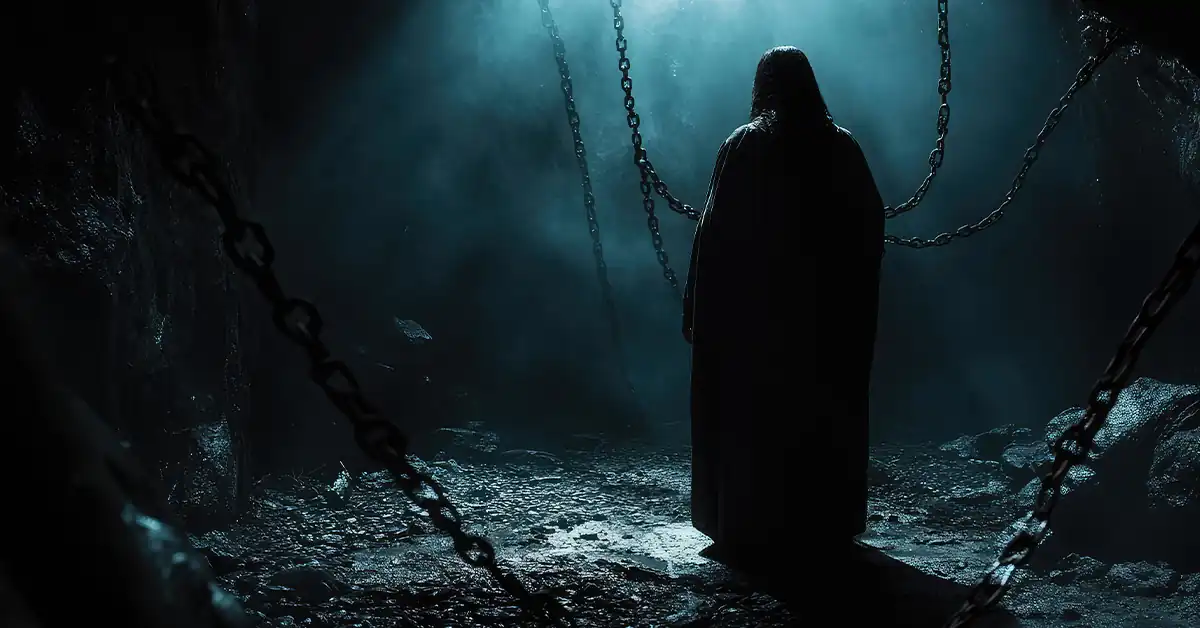
Did Jesus’ Descent to Hades Prove Salvation Extends Beyond Death?
Fear-based systems insist that death seals the door forever. Eternal Conscious Torment and annihilationism both depend on that claim. The descent of Jesus into Hades dismantles it. If He went there, He went for a reason. Nothing He does is wasted. His going down announces that the gospel crosses the grave.
The Point of the Descent
If the work of Christ only applied to people who believed before death, there would be no reason to descend to Hades at all. The descent itself testifies that His mission did not stop at the last breath. It continued into the realm of the dead to confront death from the inside and to extend good news where silence was assumed.
Who Goes Where: Sheol or Hades vs the Abyss and Tartarus
Scripture distinguishes human afterlife from the confinement of rebellious spiritual beings.
- Sheol or Hades is the realm of human dead, righteous and unrighteous.
- The Abyss is a prison for rebellious spirits.
“They begged Him repeatedly not to order them to go into the Abyss.” (Luke 8:31)
- Tartarus is named as a special holding for sinning angels.
“God did not spare angels when they sinned, but sent them to hell [tartaroo], putting them in chains of darkness to be held for judgment.” (2 Peter 2:4)
Nowhere are angels or demons said to go to Sheol or Hades. That is a human domain. This matters. If angels do not go to Hades, then the “spirits in prison” encountered by Christ in His descent are not fallen angels. They are disembodied humans.
“Spirits in Prison” Means Humans in Hades
Peter says Christ “went and proclaimed to the spirits in prison.”
“He went and proclaimed to the spirits in prison, because they formerly did not obey, when God’s patience waited in the days of Noah.” (1 Peter 3:19-20)
He also says:
“The gospel was preached even to those who are now dead, so that they might be judged according to human standards in regard to the body, but live according to God in regard to the spirit.” (1 Peter 4:6)
If Hades held humans, and Scripture never puts angels there, then the audience of that preaching was human. That undercuts the last escape hatch of fear-based theology. The preaching had an object. The object had a hope.
Soul and Spirit: Why “Spirits” Still Means Personal Beings
The human person is body, soul, and spirit. The spirit is the God-breathed power that animates the soul.
“The dust returns to the ground it came from, and the spirit returns to God who gave it.” (Ecclesiastes 12:7)
The soul is the conscious self, the seat of mind, will, and emotion. Remove the body, and the union of soul and spirit persists as a personal being. Scripture can call such persons “spirits” without denying their personality.
“The spirits of the righteous made perfect.” (Hebrews 12:23)
This explains Peter’s language. In Hades he is looking at persons who no longer wear bodies, so he uses the shorthand “spirits.” Preaching to them makes sense because they are still moral agents who can hear and respond.
Angels and Demons Have Psyche and Embodiment
A popular claim says angels are “pure spirit” with no soul. That claim collapses under the evidence.
- They think, feel, and choose. That is soul function by definition.
- They eat at Abraham’s table.
“He stood by them under the tree while they ate.” (Genesis 18:8)
- They grasp Lot by the hand.
“The men grasped his hand and the hands of his wife and of his two daughters and led them safely out of the city.” (Genesis 19:16)
- One wrestles with Jacob until daybreak.
“So Jacob was left alone, and a man wrestled with him till daybreak.” (Genesis 32:24)
- They appear as men, then as radiant beings.
“Two men in clothes that gleamed like lightning stood beside them.” (Luke 24:4)
That is embodiment, sometimes cloaked, sometimes revealed.
The difference between humans and the heavenly host is not body vs no body. It is order and glory of embodiment. That is why a “spiritual body” is still a body, only of a higher order.
“It is sown a natural body, it is raised a spiritual body.” (1 Corinthians 15:44)
Why the Compartment Story Fails
Some say Jesus descended only to escort the faithful from a paradise compartment. Abraham did not need to be freed from righteousness. If the righteous already went straight to heaven, why descend at all. If atonement was already retroactively applied only to those who had faith before they died, why enter the realm of the dead. Pageantry is not the pattern of Christ. Purpose is.
“It Is Finished” Does Not Mean “Nothing More Happens”
“It is finished” declares the sufficiency of the sacrifice.
“When Jesus had received the sour wine, he said, ‘It is finished,’ and he bowed his head and gave up his spirit.” (John 19:30)
It does not mean the victory stops moving. The finished work is applied through resurrection and descent.
“What does ‘he ascended’ mean except that he also descended to the lower, earthly regions? He who descended is the very one who ascended higher than all the heavens, in order to fill the whole universe.” (Ephesians 4:9-10)
He “tasted death for everyone.”
“But we see Jesus, who was made lower than the angels for a little while, now crowned with glory and honor because he suffered death, so that by the grace of God he might taste death for everyone.” (Hebrews 2:9)
The cross secures the power. The descent delivers it into death’s territory. The resurrection breaks the bars.
Preaching Implies Possibility, Not Futility
“What good is preaching to the dead,” say fear systems, “if there is no hope after death.” Paul asks a different question:
“How shall they believe in Him of whom they have not heard? And how shall they hear without a preacher?” (Romans 10:14)
The logic of preaching is the logic of response. Christ preached on earth to open faith to the living. He preached below to open faith to the dead. The message is the same. The realm is expanded.
Judgment Scales With Stewardship
Humans distort human-level power, so their holding place is Hades. Elohim who distort greater power meet the Abyss and Tartarus.
“From everyone who has been given much, much will be demanded; and from the one who has been entrusted with much, much more will be asked.” (Luke 12:48)
That explains the separation of destinations. It also preserves justice without surrendering the possibility of mercy.
The Consequence for ECT and Annihilationism
If the dead in Hades heard Christ, then death is not the curtain that ECT and annihilationism need it to be. The descent is not a footnote. It is a refutation. Preaching in Hades is either purposeless performance or purposeful proclamation. Christ does not perform for show. He liberates for love.
A Coherent Picture Emerges
- Humans die and enter Hades. Angels do not.
- Christ descended into Hades and preached to spirits there. That means humans heard Him.
- The soul remains personal beyond death, empowered by spirit. “Spirits” are still the same persons.
- Angels and demons possess psyche and embodied interface, yet their punishment places are the Abyss and Tartarus, not Hades.
- The descent applies the finished work into the realm of the dead and announces that grace is not confined to the living.
Conclusion
The descent to Hades is the undoing of fear’s final lock. If Jesus entered the place of the dead to preach, then salvation extends beyond death. That does not trivialize judgment. It reveals judgment as the theater of mercy. Eternal Conscious Torment and annihilationism call Hades a cul-de-sac without exits. Christ stepped into that street and turned it into a highway. This is not indulgent sentiment. It is the shape of victory. It is the logic of Universal Reconciliation.
- 09/04/2025
- WRITE A COMMENT
Recent Posts
- The Eternal False Translation: How Aionios Was Corrupted Into Eternal
- The Rich Man and Lazarus
- Does Grace Last Forever?
- His Love Never Fails
- Love and Forgive Your Enemies
- His Mercy Endures Forever
- Scriptures That Teach Universal Reconciliation
- The Lesson of James, Peter and John
- Progressive Salvation is Biblical!
- The Gates Never Shut!


